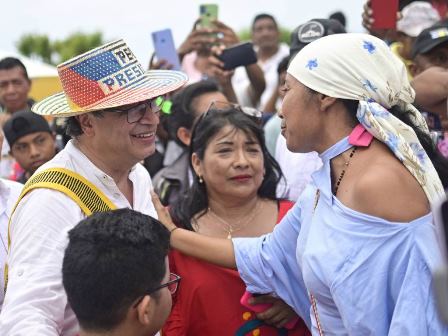Bogotá, June 28 – The Colombian government will hand over property rights to families and two community care units for Wayuu children under the age of five today in Riohacha, department of La Guajira.
In line with the program of President Gustavo Petro, who, together with his cabinet of ministers, is conducting the “People’s Government” campaign in this border region in the far north of the country, the Pact for Transition is also signed.
The region’s energy transition document will be signed by Wayuu authorities, municipalities, energy companies, and national and local governments.
Yesterday, the government announced that it will issue two decrees to enforce the priority use of water for human consumption in the department of La Guajira.
Likewise, Petro and the head of the Ministry of Information Technology and Communications, Mauricio Lizcano, delivered 3,300 computers and 51 innovation labs to 117 schools in the department, which will benefit 47,000 students.
This Tuesday, Environment and Sustainable Development Minister Susana Muhamad and National Natural Parks Director Luis Olmedo announced the plan for the restoration, sustainable use and protection of 24,000 hectares in Macuira National Natural Park.
This is a process that will require an investment of 40 billion pesos (about $950 million) and will be carried out with the support of the region’s traditional ethnic authorities.
As part of the national government’s tour of La Guajira department, Mauricio Rodríguez, director of the Special Administrative Unit for Solidarity Organizations, reported that the body will invest nearly 1.8 billion pesos (about $429 million) this year in the reactivation of the Manaure salt flats .
The investment includes the reactivation of industrial production, the washing plant, the activation of the salt mill and the strengthening of salt transport and marketing.
The reactivation will benefit more than three thousand families in that region and create at least 400 jobs, the announcement said.
Since last Monday, the Colombian President has been leading the government with the popular campaign in the department of La Guajira, one of the most vulnerable areas in the country.
This area in Colombia’s far north is predominantly indigenous (the Wayuu people make up 48 percent of the department’s population) and has the highest rate of financial poverty in the country, at 67.4 percent in 2021, according to the National Administration of Statistics.
These data are reflected in the preventable deaths of the elderly and children from malnutrition and related causes, the failure to ensure the economic, social, cultural and environmental rights of a large part of the population, and in begging and street situations. according to the Special Rapporteur on such rights of the Inter-American Commission on Human Rights.

